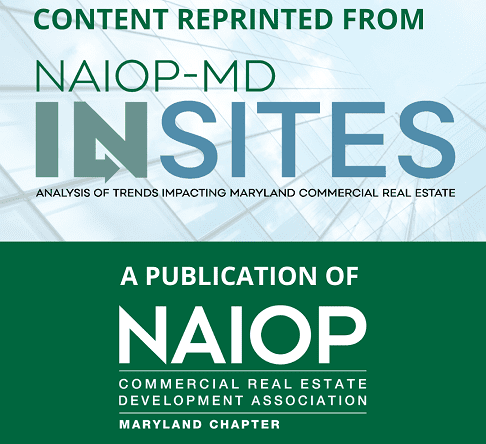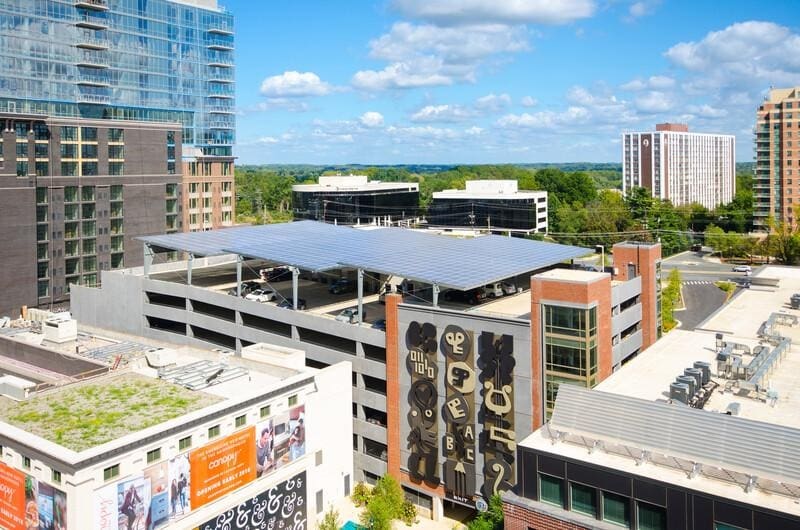 Despite all the debates and concerns over government mandates to lower greenhouse gas emissions and implement all-electric building codes, major commercial real estate companies are moving forward with bold decarbonization goals.
Despite all the debates and concerns over government mandates to lower greenhouse gas emissions and implement all-electric building codes, major commercial real estate companies are moving forward with bold decarbonization goals.
Jones Lang LaSalle, Duke Realty, CBRE and Prologis have pledged to achieve carbon neutrality across their entire portfolios by 2040. Federal Realty Investment Trust and Kimco Realty Corporation last year announced plans to achieve net zero carbon in Scope 1 and 2 emissions by 2050. Several companies, including JLL, have committed to achieving net zero in their own offices by 2030. And the list goes on.
To achieve those goals, companies will have to hit ambitious interim benchmarks, engage clients and partners in decarbonization efforts, and overcome significant technological and financial hurdles that currently stand in their path.
“I think what JLL is doing is extremely exciting. We work with clients to develop innovative projects that show how sustainability can be implemented at scale,” said Jay Wilson, Vice President of Sustainability at JLL.
Increasingly, tenants are choosing not only to complete high-efficiency fitouts but to choose mostly or solely electric systems.
“We worked on a recent tenant fitout that had to include a commercial kitchen because the company expected to do a lot of entertaining,” Wilson said. “Originally, they insisted they would need a gas stove to deliver the level of meals they planned. But their sustainability goals guided their choices and they discovered they could do everything they wanted with an induction cooktop.”

As part of its decarbonization efforts, Federal Realty has installed 13.6 MW of solar energy capacity on its properties, including a rooftop array at Pike and Rose. Photo courtesy of Federal Realty
A current fitout of a 40,000-square-foot tenant space in Washington, D.C. has been designed to achieve both LEED Platinum and WELL Platinum certification and is also pursuing ILFI Zero Carbon certification.
“We were able to achieve nearly 50 percent energy efficiency over baseline code and the architects lowered the embodied carbon in the project by 30-40 percent by smart materials choices,” he said.
Beyond the selection of energy efficient and electric equipment, information systems and advanced technology are greatly aiding the path to net zero, Wilson said.
“There’s the old adage that you can’t manage what you don’t measure,” he said.
Consequently, JLL has a proprietary program called Canopy that tracks emissions from all sources – including energy use, transportation, water use and waste management – to give companies clear knowledge of their carbon footprint. JLL also acquired an end-to-end artificial intelligence engineering platform, Hank, that autonomously optimizes management of commercial buildings’ HVAC systems in order to increase comfort, conserve energy, and improve indoor Air Quality (IAQ) standards.
At Federal Realty, several key initiatives are helping lower GHG emissions. They include buying low-carbon or zero-carbon power in markets where it is available, completely converting nearly all of its properties to LED lighting, an expected $2.3 billion investment in LEED-certified buildings, and a major deployment of rooftop solar systems. Federal has installed solar PV on nearly one-quarter of its properties, totaling 13.6 MW of generating capacity. The company opted to own, rather than lease, its solar installations in order to maintain full control of its rooftops and the ability to accommodate changing tenant needs.
Federal has also altered its tenant services to advance its sustainability goals. It offers tenants the option to buy power from onsite solar installation at below-utility rates, “which is mutually beneficial,” said Emily McLachlan, Director of Sustainability. “If we have a place to put the power, we can build more capacity. The tenant saves on their utilities and also advances their ESG goals.”
Federal Realty developed a Green Box (as opposed to a white box) program for office, retail and residential tenants to deliver more sustainable fitouts. Last year, it created design and construction guidelines specifically aimed at small, independent retailers to help them identify feasible and effective actions to make their properties more sustainable. It also tackled the complexities of implementing major, sustainability initiatives in triple net lease properties.
“We worked on provisions in our leases to try to make sure we are talking to tenants about the types of things we want to invest in that help with environmental conditions and energy efficiency, and how we share both that benefit and cost,” said Dawn Becker, Executive Vice President, General Counsel and Secretary of Federal Realty. “We are redefining the contractual relationship to make sure we are doing it cooperatively and to our mutual benefit.”
Current initiatives won’t get CRE companies all the way to net zero and sustainability professionals see hurdles on the horizon. Technologies for all-electric building infrastructure, HVAC equipment and energy storage need to advance, McLachlan said. While Federal Realty hasn’t yet had to pay a premium for green energy, McLachlan said those prices could increase as demand rises
Certain energy-intensive buildings, such as data centers, are particularly difficult to convert to net zero, Wilson said. And the increasing adoption of electric vehicles will create a new challenge.
“Between the growing use of electric equipment in buildings and adding EV infrastructure to real estate, there is going to come a moment where we are adding so much electric need that we are going to have to add capacity,” he said. Consequently, “we are doing a solar feasibility study on all of our EV projects to see if we can gain more capacity from clean energy sources.”
Sustainability professionals, however, insist that some extra effort and extra expense will be needed to succeed in real estate in the coming decades.
“We used to talk about a green premium versus a brown discount in real estate,” Wilson said. “Now, the bottom line is that if you aren’t investing in sustainability, your property will be disadvantaged in the market.”
Copyright 2022, NAIOP Maryland. Reprinted with permission from NAIOP-MD InSites. www.naiopmd.org











